Story highlights
About 20,000 people have been displaced by mudslides, official says
More than 400 people laid to rest in mass burial this week in Sierra Leone
Sierra Leone is facing significant health challenges after this week’s devastating mudslides claimed nearly 500 lives, a government official said, with the number of dead expected to rise.
Eighteen bodies were discovered Saturday, bringing the death toll to 499 people, according to Sidie Yahya Tunis, the tourism and cultural affairs minister. More than 150 children were among the dead, he said.
The death toll includes those killed in mudslides on the outskirts of the West African nation’s capital, Freetown, and fatalities from flash floods in other provinces, Deputy Health Minister Madina Rahman told CNN earlier.
About 20,000 people have been displaced by the mudslides, including 5,000 children, presidential spokesman Abdulai Bayraytay said.
The country also must battle cholera and malaria, Rahman said, in the wake of one of the deadliest natural disasters to hit Africa in recent years.
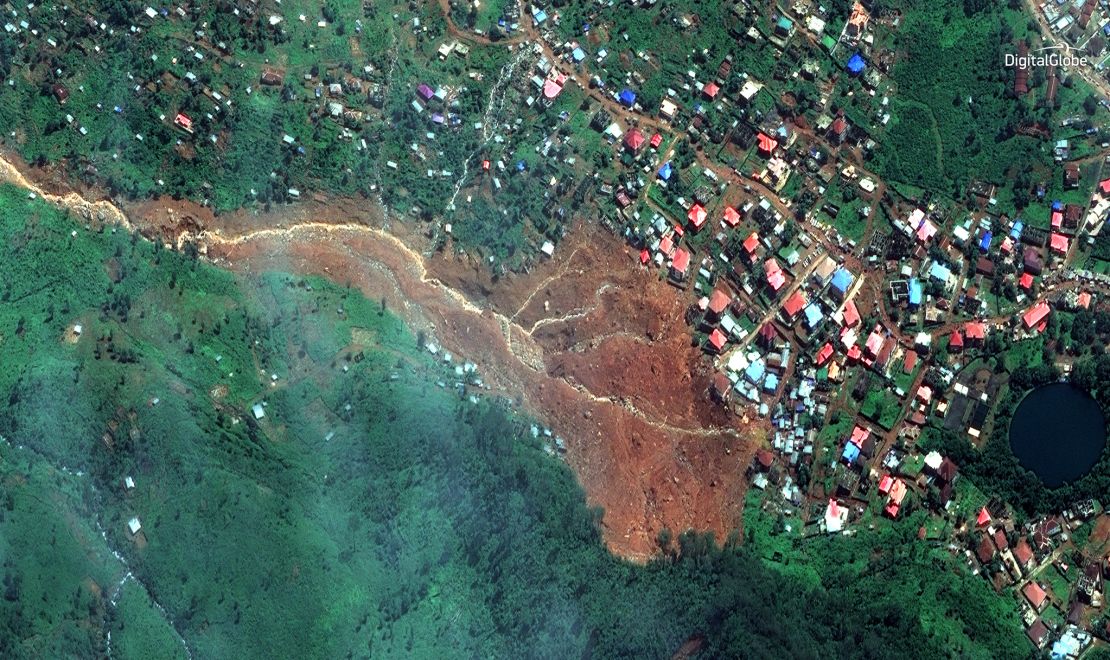
Some residents have gotten skin infections from the water they have been washing in, and officials are putting in place plans for cholera preparedness and prevention, she said. “We are equipped to a point. We can’t do it alone,” she added.
The crisis began Monday when heavy rains caused mudslides from the denuded slopes of Mount Sugar Loaf, about 5 miles from Freetown. Houses that hugged the slopes, many of them little more than wooden shacks with tin roofs, were buried after torrents of mud poured down under the force of the water.
Rescue workers told CNN they were losing hope of finding whole bodies in the debris, with hundreds ofpeople still unaccounted for. Some body parts have washed up on nearby beaches.
The city morgue at Connaught Hospital in Freetown has been overwhelmed by the influx of bodies.
On Thursday, 413 people were laid to rest in a mass burial in the nearby town of Waterloo, said Tunis, the tourism and cultural affairs minister.
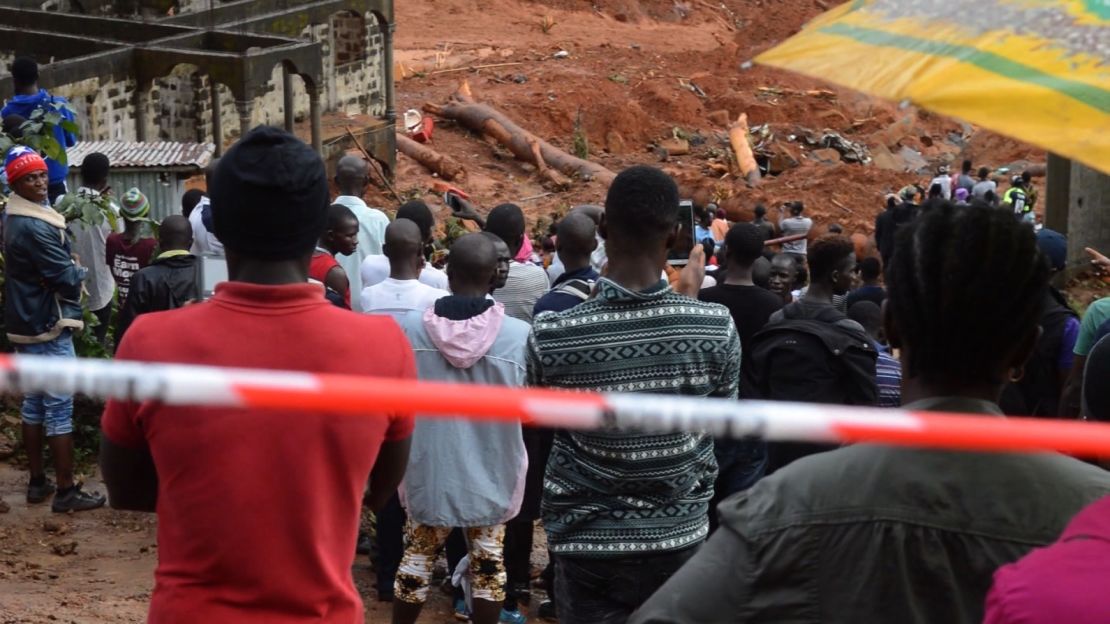
Rahman, the health official, appealed for international support, saying the country can’t do it alone.
“The number of people dead is changing every day,” she said. “We have just done a census recently, and we are working with the statistics office to see how many people are on that site and how many people are unaccounted for and how many people were dead and buried.”
Elhadj As Sy, secretary-general of the International Federation of Red Cross and Red Crescent Societies, also told reporters in Geneva, Switzerland, that other countries must step up, saying that Sierra Leone was facing a crisis “way beyond (its) capacity.”
Many appeared shell-shocked in the wake of the disaster, crying as they walked along or looked for missing loved ones. One woman told CNN she had lost most of her family, including a sister who was heavily pregnant.
Another resident, Ishmael Tomboyeke, said he was also looking for his sister’s body. After seeing the mudslide, he said, “I ran there, I saw where the house was, everything was demolished.”
More rain expected
Meanwhile, authorities are preparing to evacuate other hillside areas amid concern more landslides could take place.
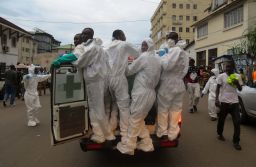
“Evacuation is being discussed. Some have been happening but not on a large scale,” Tunis said. “We have to plan, and we are working at looking at the numbers involved.”
More rain is expected over the next few days, increasing the threat of a new landslide, Tunis said Thursday.
“At this point, more hands are needed on deck, both locally and internationally. The gravity is huge, and the magnitude is just so much for this nation to handle. I pray that other countries will come in to assist,” he said.
Britain steps in with $6.4 million in aid
The United Kingdom is offering an initial $6.4 million in emergency support to provide clean drinking water food and medicines, UK International Development Secretary Priti Patel announced. The money will go to UNICEF, the UN children’s agency that’s also responsible for water and nongovernmental organizations.
“This tragedy comes shortly after the Ebola crisis, which Sierra Leone has worked so hard to recover from,” Patel said. “Britain was at the forefront in tackling that deadly disease, and we remain shoulder to shoulder with Sierra Leone today after these devastating events.”
In 2000, the UK, a former colonial power of Sierra Leone, sent troops to end the bitter civil war there. More recently Sierra Leone was one of the country’s worst hit from the Ebola crisis, with nearly 4,000 dying from the disease.
“Our new support will provide basic life-saving supplies like food, water, shelter and clothing to people who have lost everything,” Patel said. “The international community must follow our lead and step up to the plate.”
Mass burial
Mourners gathered Thursday to pay respects at a mass burial attended by President Ernest Bai Koroma and Liberian President Ellen Johnson Sirleaf.
A team of around 100 men gathered to dig graves under the burning sun.
“I’m happy to do this for my fellow countrymen. It’s a sad time, but we have to pull together,” Momodu Bah told CNN.
Hundreds started to line the perimeters of the cemetery in Waterloo in the afternoon, eager to pay their last respects. Some climbed trees to get a better look.
Muslim and Christian prayers were offered during the short interfaith ceremony. The imam’s voice trembled as he read prayers for the dead, and Koroma laid a wreath to commemorate the deaths.
‘Another grim episode in our nation’s history’
In an address, Koroma said: “We have come here to pay our last respects to our loved ones … our friends … and to our community. We’ve come to comfort the bereaved and reassure them that they are not alone.
“This is another grim episode in our nation’s history. They had their hopes and aspirations for a bright future.”
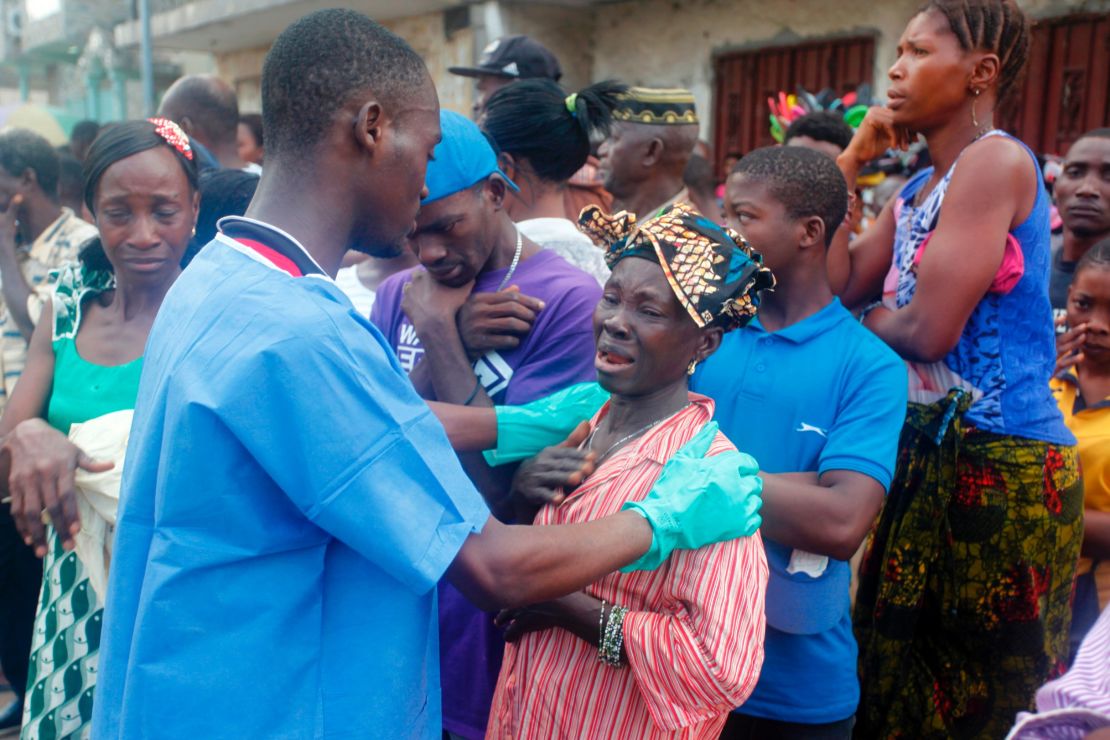
He said a group of students studying together were among the victims in an house that was crushed.
The President also spoke of a man who had saved for years to move his family into the area affected by the mudslide and another who was due to marry Friday.
“These heartbreaking stories are so painful,” he said. “We have buried them, but we will not bury our hopes. Sierra Leone will rise again.”
Private donations
Private citizens have been turning up at the disaster site with food donations, clothing and other items to help the displaced. Others are donating money, and a group of around 100 young people held a candle-lit vigil Thursday to mourn friends who had died.
Organized by a local nongovernmental organization called the Family, some carried a banner of one of their friends, a woman who was just 26. Some marchers wept openly.
As they gathered under the famous Freetown Cotton Tree, they said a Christian prayer, and an organizer called for a member of the crowd to offer up a Muslim one, too, in a symbol of religious unity and tolerance.
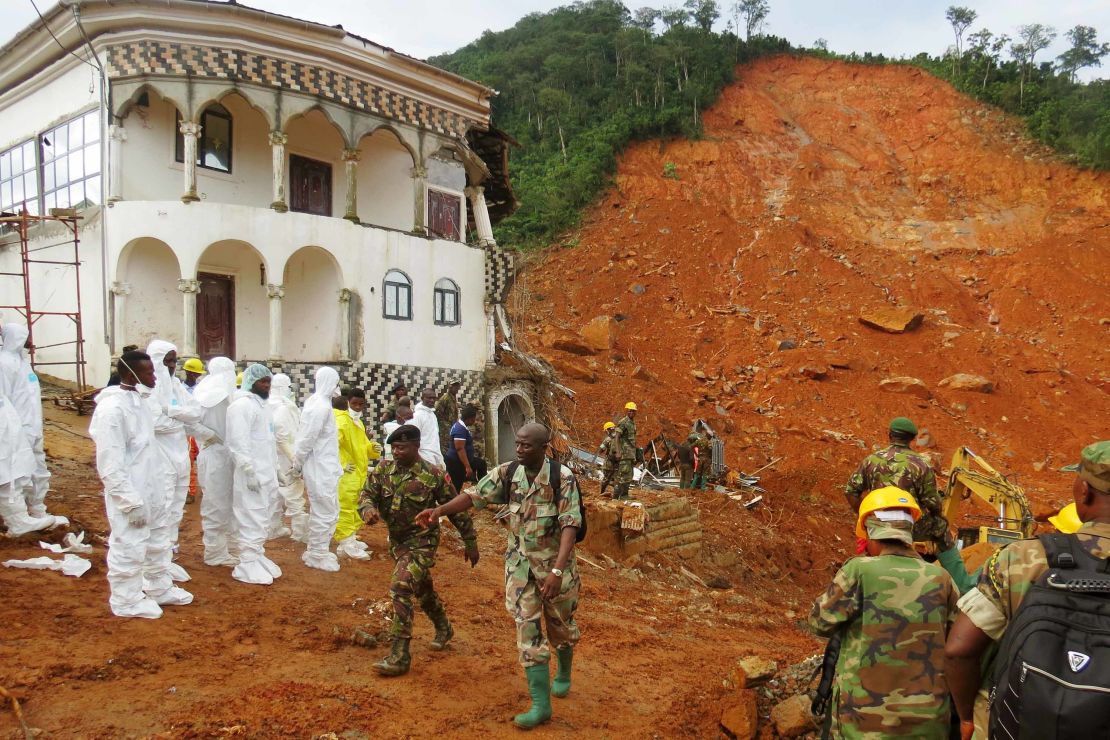
Flooding is not unusual in the region, which is experiencing its rainy season.
But this year has been particularly wet, with Freetown receiving more than 27 inches of rain between July 1 and August 13 – more than double the average of 11.8 inches, according to the US National Weather Service’s Climate Prediction Center.
CNN’s Stephanie Busari wrote and reported from Freetown, while Hilary Clarke wrote from London. CNN’s Fridah Okutoyi and Jessica Suerth contributed to this report.
